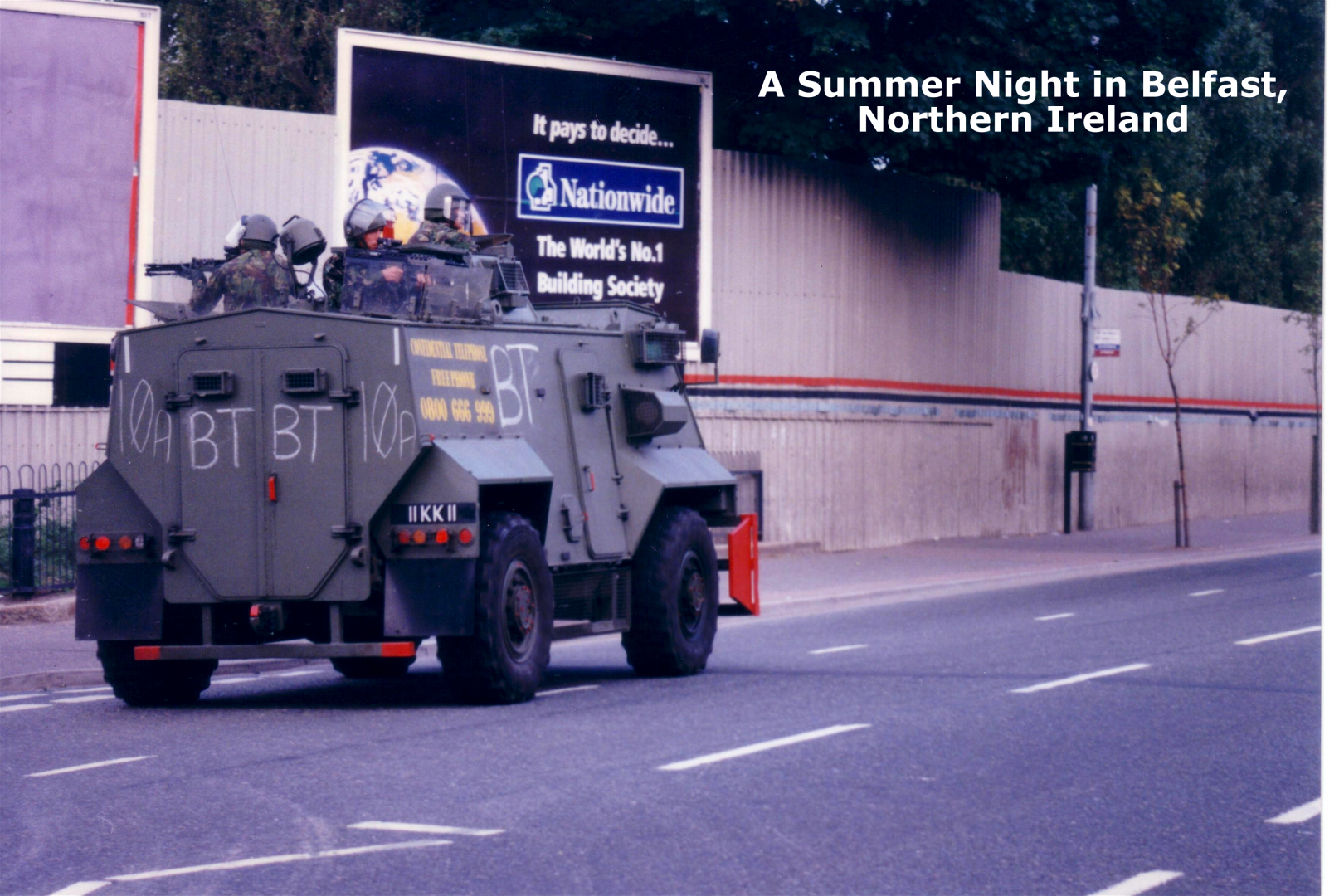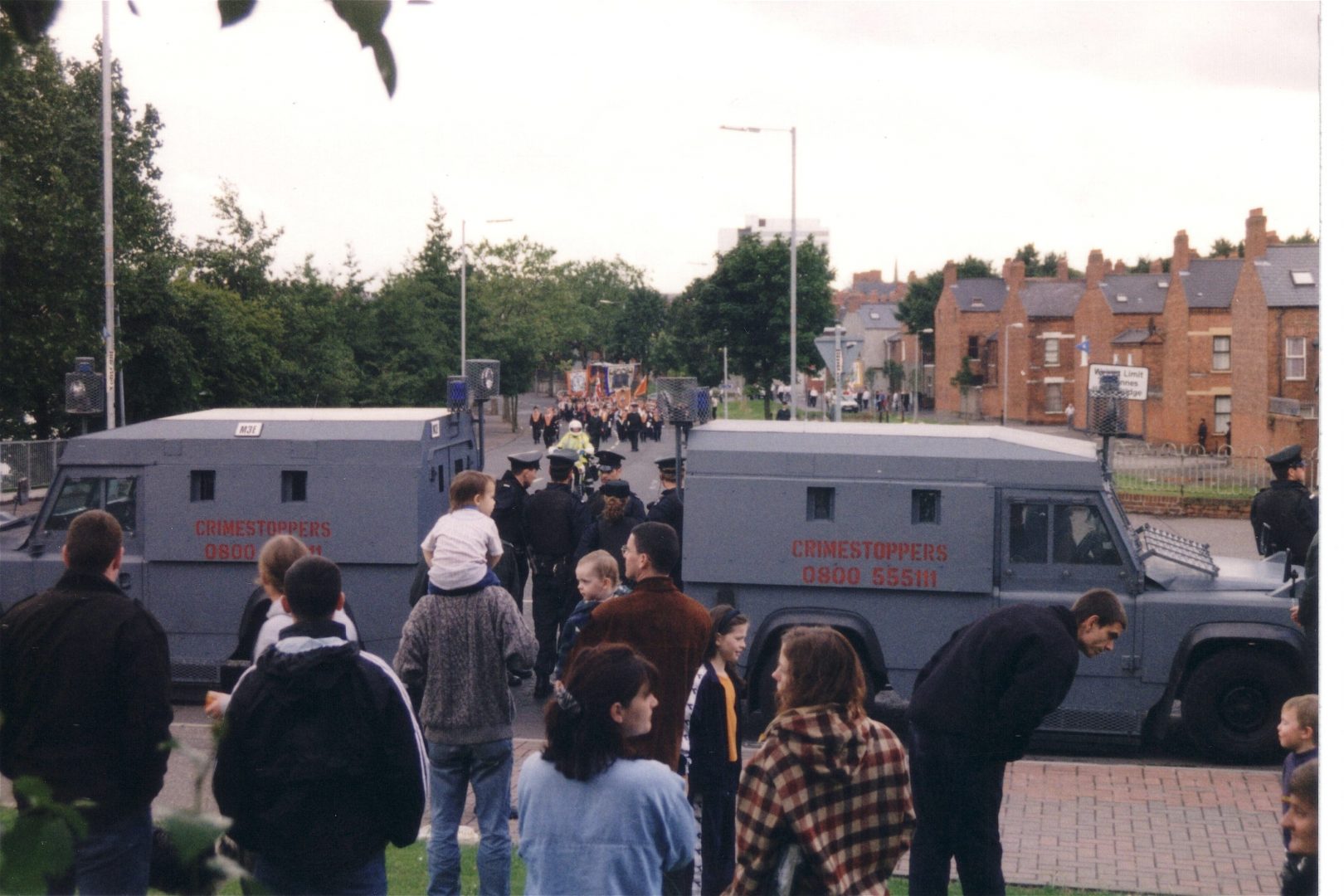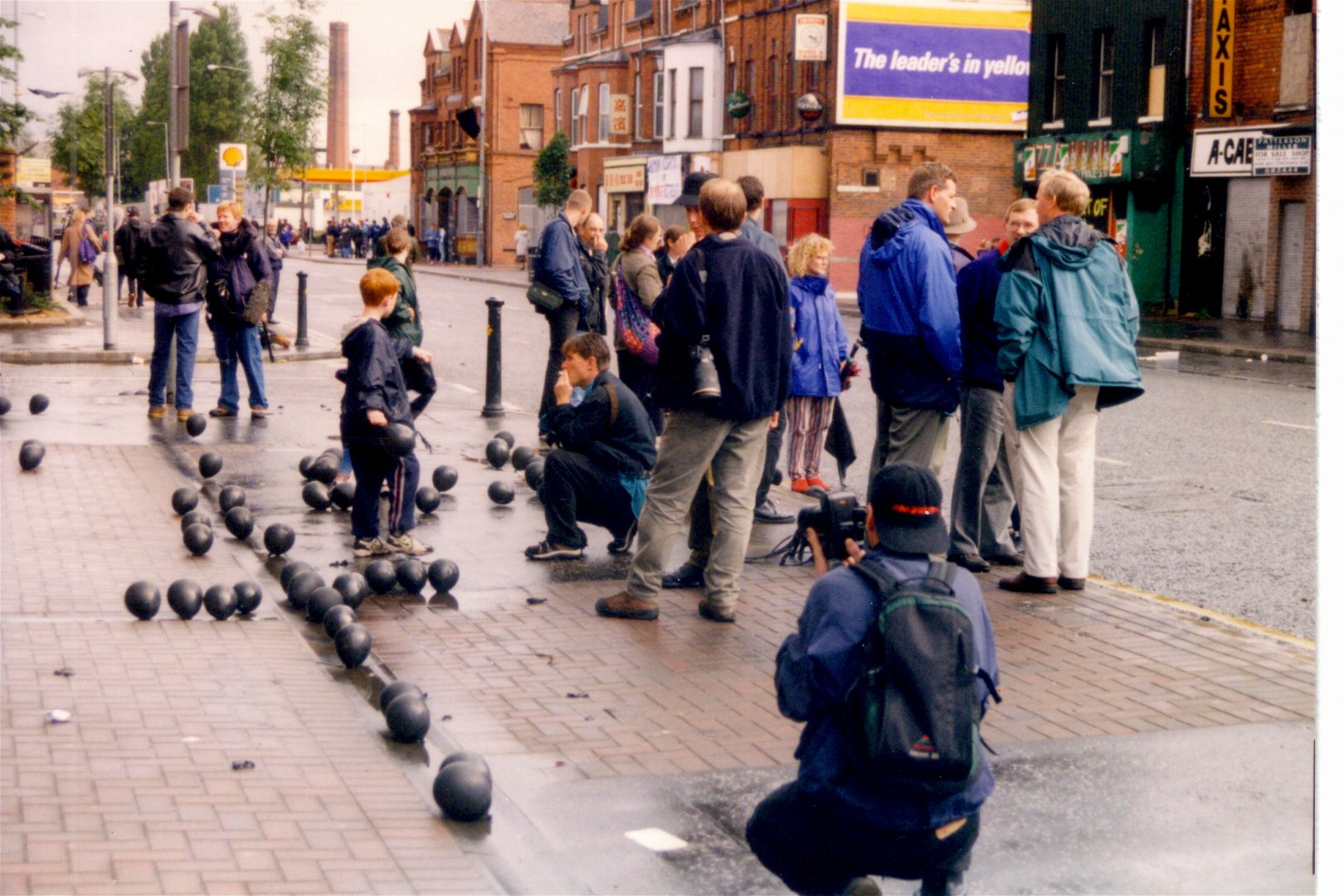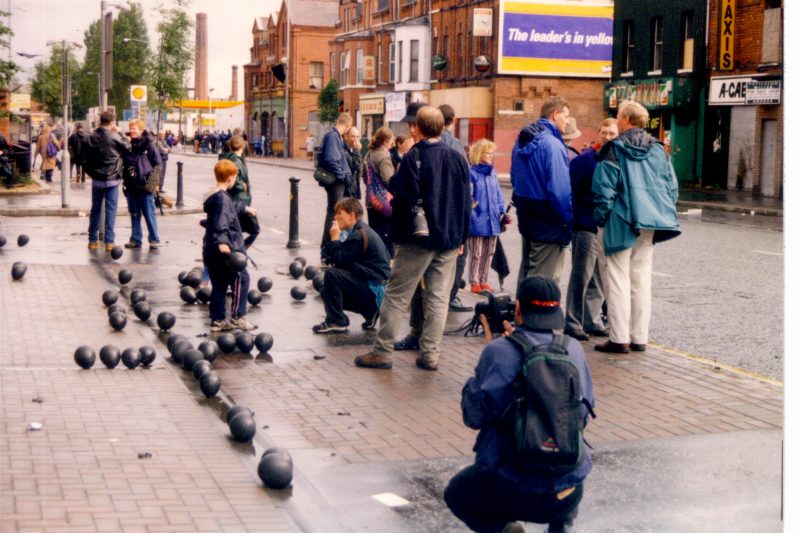A Summer Evening in Belfast

Author: James Mattil
5:00 A.M. 11 July 1998, Belfast, Northern Ireland.
I’d been on watch since 10:00 p.m., alternating between patrolling the riverside and perching atop the railroad, switching tower. I’d been warned the previous night to stay off the tower lest my silhouette appear to be that of a sniper and attract possibly lethal attention from the SAS, but it was more comfortable than walking and afforded an excellent viewpoint to see and hear anyone approaching our poor, wee community on the Lower Ormeau Road in Belfast, Northern Ireland.
In the distance, the fireworks, drums and canned music of the July 12th celebration had faded away, the dreary, Belfast darkness was punctuated only by the occasional chants and yells of drunken, diehard loyalists. This was whom we feared.
Last night the railroad tracks had been engulfed in flames after a firebombing raid on our Catholic enclave. We vowed it wouldn’t happen again and mounted an all night vigilante patrol until the crisis passed. A month earlier, the Northern Ireland peace process had culminated in the Good Friday Peace Agreement, negotiated to end 30 years of warfare on this northern end of the emerald island. So, this was peace…ominous and deathly silent.
As the rain began, someone came running through the darkness, “They’re coming! They’re coming.” was all he said, or needed to say. I clamored down from the watchtower and ran to my tiny brick row house, propelled by adrenalin coursing through my veins, and grabbed the weapons – my ice axe and a steel bar. This must have been how it felt 30 years earlier, when unarmed Catholics were forced to the streets to defend their miserable homes from Protestant mobs at the start of “The Troubles.”
Apprehensively, I started to run, then slowed to a walk, up the block to the Lower Ormeau road. I was joined by other faceless men, grimly walking to confront what no one should ever have to, the evil face of bigotry, hatred and men who would kill you and your family for no understandable reason.
At the corner we hid our paltry stash of weapons in case the police arrived. Although there had been firebomb attacks the previous night, and hand-to-hand fighting the night before that, there were no police or army patrols this night, no protection from the sectarian RUC police force – 93% of which are Protestant.
If they did show up, we knew it wouldn’t be to protect us, but to arrest us. This was an established fact of life in Belfast. The belief is that when the police disappear, trouble is close behind. We waited at the corner, quietly, each man alone with his thoughts and fears. A few cars arrived, each with four doors and four men inside. They got out quietly and businesslike, no more eager for this than we were. I recognized a few, but there were others I didn’t know and didn’t want to, men who appeared from the shadows; these lads were the Provos – the IRA. We might have to fight, but now we knew we’d win, our homes would not be burned tonight. Not everyone would be so fortunate this night.
Across town in another Catholic ghetto, an evil, hideous tragedy was unfolding, unknown to us. A home was being attacked with petrol bombs as the family slept in their beds. Three young boys were screaming from their room, trying to find the window and jump to safety. They never made it and all three Quinn children died that night at the hands of unknown, cowardly bigots, because their parents, a Catholic and a Protestant had married.
These parents were the kind of people the government likes to hold forth as examples of how the two sides could get along, though the world rarely hears of the risks involved in mixed marriages, or in living outside the Catholic ghettos. Yet, these killers are not seen as terrorists, they’re simply British citizens, church-going Loyalists, members of the Orange Order and defenders of the faithful, killers who prey on the most vulnerable and enjoy it.
Meanwhile, we waited in the cold rain, ignorant of the tragic horror unfolding just four miles away, waiting for our troubles to begin. A car returned from a reconnaissance run, the coast was clear; there’d be no Loyalist attack tonight. The Loyalist crowd a half-mile down the road had disbanded. Maybe they heard the news of the three young Quinn children and were happy, satisfied that blood had been spilled.
Almost 4:00 a.m., we prepared to pack it in and go home for some sleep, when we heard the drone of heavy engines in the distance. Trash trucks? Jesus no! The Brits were coming. All hell broke loose; the warning was sounded, women yelling, whistles blowing. One after another the heavy armored vehicles moved in, troops took up positions along the main road and not a policeman anywhere. Our entire community was being placed under protective Custody – all for our own protection – a blatant lie.
An Orange Order parade was scheduled to pass through our area the next morning, not a festive parade, but a demonstration of one group’s ability to dominate another. Like dogs, they would come to urinate on our community, staking out their territorial claim. A ban on a similar march down the Garvaghy Road to Drumcree church had sparked violence by Unionists and Loyalist supporters of the Orange Order’s “right to march”, where they want and when they want. As a concession for banning the Drumcree march, the government would allow them down the Lower Ormeau Road instead and despite our objections as residents.
People here were furious, but not surprised. The decision to allow this in-your-face march, was like permitting the Ku Klux Klan to march through Harlem in New York, or allowing Nazis to parade through a Jewish neighborhood. And yet, this was being permitted and backed up by the power of the British Army.
At Drumcree, Loyalist protesters had gathered in the tens of thousands, taunting and attacking police, demanding that their march be forced through the tiny nationalist enclave. A tense standoff had developed and violence flared as rioting spread throughout the Six Counties.
The Lower Ormeau residents had planned a peaceful protest, but the security forces had other plans. By sealing off the area, they could isolate us and limit access to the area preventing supporters from coming to our aid, an apparently legitimate strategy, except that they had not and would not do the same at Drumcree. Instead, Loyalists were allowed to mass up to 25,000 people and lay siege to the Garvaghy Road community, as part of their violent protest. Meanwhile, Nationalists were denied the right of assembly and of freedom of movement. Two wrongs, made two wrongs, but few expected anything better.
Expecting that we’d be locked-in and a curfew imposed that night, we were allowed out to stock up on groceries. As we drove to the store, we saw a large convoy of armored RUC Land Rovers and feared the siege would start sooner than expected. Returning home from a quick shopping run, we found the road was blocked by an army/ police checkpoint and we had to prove residency before being allowed to pass, they wrote down our names. Now into our area, we ran into another checkpoint at the end of our street, manned by masked soldiers with automatic weapons. Objecting to a second round of harassment within the secured zone, the masked men in riot gear surrounded our car, threatening us if we didn’t comply. I refused, demanding they explain their authorization for their actions. They refused. In the backseat, my son was crying and shaking with fear.
I got out of the car, ignoring the RUC inquisitioner and called out to nearby international human rights observers, knowing there was nothing they could do but observe and hopefully discourage the security forces. Having made our point, we submitted our names and address, worrying that this might prompt a late night visit to raid our home, as they are allowed to do under their law.
At home, but not safe, we watched the television news of the Quinn family firebomb murders, noting that the media had stopped publicizing the count of firebombings against Catholics, which had earlier reached 150 attacks for the week. Watching the news, our son asked a dreadful question, “Does this mean they’ll kill all the children named Quinn?” He had always been proud of his family name – Quinn – but today it brought terror.
Despite the killings, the Orange Order would march anyway, as the dead children were only Catholics after all. It would be a “march of shame.” The next morning, the “Glorious Twelfth,” the march went ahead, while our neighbors held a silent protest, holding black flags along the Ormeau Road, homes draped in somber, black banners. The world media was there to watch.
The cold wind and drizzling rain was a perfect setting for the march of shame. This would be the first time our 9-year old son had seen the dreaded Orangemen – up close and personal and he was scared. The RUC guarded the parade route, while British troops lurked in alleyways and behind bushes, with armor in reserve, just a block away. The march was delayed by a bomb threat, but then they came, flags flying, walking to a methodical drumbeat. As the pathetic procession passed through the gauntlet of black flags and silent protestors, our son saw the marcher’s faces and saw the fear on those faces. These were bitter, old men. Our son was pleased that our people had remained silent and dignified. He was happy, his fears diminished as he saw the adversary. And that could be a real problem in the future. At age 9 he was afraid, at age 16 he’d be damn angry.
A week later, we moved to America, like millions of Irish families before us. Unlike so many, we’d not been driven away by starvation or violence, but by the absence of hope. Without hope, people come to realize they have little to lose and when they realize the nature of their adversary, they are willing to fight back. Soon, our son could well become one of those faceless men who appear from the shadows when trouble threatens, men willing to die, men willing to kill, so that there will be no more funerals for children burned to death in their beds.
To many people, such men are terrorists, to others freedom fighters, it all depends on the perspective – the group you were born into. The last few years have seen still more deaths; the peace process is fragile. As July 12th approaches, as it does every year, the Orange Order again demands its right to march, celebrating their dominance over Catholics. Everyone loves a parade, except in Northern Ireland.




